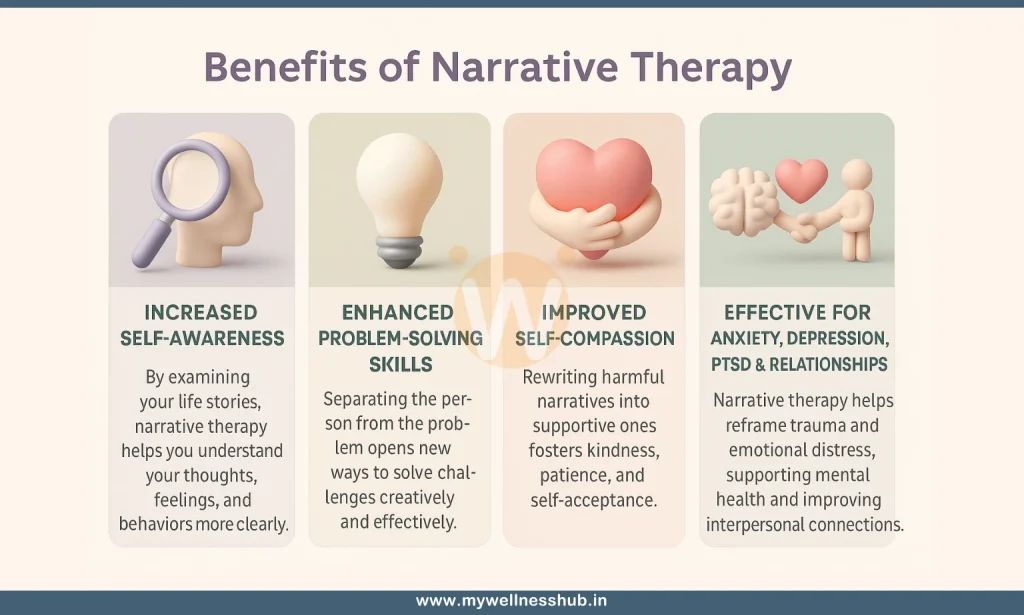Understanding Narrative Therapy: A Simple Guide
By Prapoorna M
Last Updated: May 18, 2024
Have you ever felt like you’re stuck in a story that just doesn’t seem to reflect who you are today? Or perhaps you’re searching for a way to rewrite the chapters of your life that no longer serve you well? Narrative therapy is based on the concept that our identities are shaped by the narratives we carry about ourselves and our lives. These stories can influence how we see the world, how we interact with others, and even how we cope with challenges. But what if you could change your story and, by doing so, change your life?
Book Your Relationship Counselling
How Narrative Therapy Works
Have you ever considered how the stories we tell ourselves influence our daily lives? In narrative therapy, these stories are not just seen as narratives but as powerful tools that shape our identity, behavior, and perceptions. By understanding and reshaping these stories, we can create significant changes in our lives.
Externalization: Your Story is Not Your Identity
One of the most transformative techniques in narrative therapy is externalization. This involves seeing your problems as separate from yourself. Think of it like this: instead of saying, “I am anxious,” you might say, “I experience anxiety.” This small shift in language helps create distance between you and the issue, making it less overwhelming and more manageable.
For example, if someone struggles with low self-esteem, they might begin to talk about “the critic” as a character in their story. By doing so, they can start to question and negotiate with the critic’s harsh judgments rather than accepting them as an integral part of who they are.
Objectification of Problems: Viewing Challenges as External Objects
Another key technique is the objectification of problems. This means viewing a problem as an object outside oneself. It’s like placing your worries on a shelf and examining them from a distance rather than carrying them around all the time. This perspective can be incredibly empowering. It allows you to see the problem as something that can be handled, modified, or even discarded rather than an inherent part of your being.
Alternative Storylines: Rewriting the Script
Narrative therapy also encourages the use of alternative storylines to challenge and expand the dominant stories that shape our lives. Suppose you’ve always seen yourself as someone who is not good at public speaking due to a few bad experiences. In this therapy, you might explore moments when you successfully engaged in public speaking or when you felt confident speaking in other contexts.
By identifying and strengthening these “alternative storylines,” you can begin to see that your initial narrative is not the only one that defines you. This process opens up new possibilities for action and interaction in your life that align with your values and goals.
Empowering Change Through Stories
Each of these techniques not only helps in dealing with personal issues but also enhances your overall mental well-being by fostering a greater sense of control and empowerment. Narrative therapy isn’t about changing who you are; it’s about changing how you see yourself and how you interact with your problems.
Narrative Therapy Techniques
| Technique | Description | Benefit |
|---|---|---|
| Externalization | Viewing problems as separate from oneself. By naming and characterizing issues, individuals can see them as external entities rather than intrinsic parts of their identity. | Reduces feelings of overwhelm and fosters a more objective perspective, making it easier to tackle the issues. |
| Objectification | Analyzing problems as external objects. This involves breaking down complex problems into smaller, manageable parts that can be addressed individually. | Encourages creative problem-solving by allowing individuals to approach issues from different angles and consider various solutions. |
| Alternative Storylines | Exploring new perspectives and solutions. This technique involves identifying and developing alternative narratives that reflect a person’s strengths and capabilities rather than focusing solely on problems. | Opens up possibilities for change and growth by highlighting positive aspects of a person’s life and potential for overcoming challenges. |
The Benefits of Narrative Therapy
Narrative therapy offers a variety of benefits that can significantly enhance personal development and mental well-being. By using storytelling to separate ourselves from our problems, we gain a deeper understanding of our experiences, which can lead to profound personal growth. Let’s explore how we can make a real difference in your life or the lives of those around you.

Increased Self-Awareness
One of the most profound benefits of narrative therapy is the increase in self-awareness it offers. By encouraging you to tell your story and reflect upon it, narrative therapy helps you understand the underlying themes and patterns in your life. This increased awareness can lead to greater insight into your motivations and behaviors, helping you to make more informed decisions and foster personal growth.
Enhanced Problem-Solving Skills
Narrative therapy also enhances your problem-solving skills. By externalizing problems and viewing them as separate from your identity, you can tackle issues more objectively and creatively. This method allows you to explore various solutions that you might not have considered when you felt personally engulfed by the problem. It’s like stepping back to see a painting in full view rather than focusing on one brushstroke.
Improved Self-Compassion
Self-compassion is another key benefit. Narrative therapy teaches you to treat yourself with kindness and understanding rather than harsh judgment. By rewriting your internal narratives, you can change critical or damaging self-perceptions into supportive and nurturing ones. This shift is crucial for mental health, as it can reduce feelings of shame and inadequacy and promote a healthier self-image.
Also read: How to Deal with Forgetfulness?
Effective for a Variety of Issues
Narrative therapy is particularly effective for dealing with specific mental health issues, including anxiety, depression, PTSD, and relationship challenges:
- Anxiety and Depression: By helping you rewrite the narratives that contribute to anxiety and depression, narrative therapy allows you to see possibilities and solutions outside of those negative storylines. This can lessen feelings of hopelessness and boost mood.
- PTSD: For those dealing with PTSD, narrative therapy offers a way to reshape traumatic narratives into stories of survival and resilience, reducing the power of traumatic memories.
- Relationship Challenges: Narrative therapy can help individuals and couples reframe their interactions and conflicts, fostering better understanding and healthier communication.
Getting Started with Narrative Therapy
Beginning your journey with narrative therapy involves several practical steps that can help ensure a positive and effective experience. Here are some key actions to consider:
1. Understanding Your Needs
- Before starting narrative therapy, it’s important to reflect on your personal goals and what you hope to achieve. Identifying specific issues, such as anxiety, depression, or relationship challenges, can help guide your search for a therapist.
2. Researching Qualified Therapists
- Finding a qualified therapist who specializes in narrative therapy is crucial. Look for professionals who are licensed and have specific training in narrative techniques. You can verify credentials through professional organizations such as the American Psychological Association (APA) or the National Board for Certified Counselors (NBCC).
3. Evaluating Therapist Compatibility
- Compatibility with your therapist can significantly impact the effectiveness of the therapy. Schedule initial consultations with potential therapists to discuss your goals and get a sense of their approach. This can help you determine if their style aligns with your needs.
4. Preparing for Sessions
- Entering therapy with an open mind and a willingness to engage in storytelling can enhance your experience. Be ready to explore your narratives and consider how they shape your identity and behavior. Active participation is key to making progress in narrative therapy.
5. Setting Realistic Expectations
- Therapy is a process that takes time and effort. Set realistic expectations about the pace of progress, and be patient with yourself as you work through your narratives. Regularly reviewing your goals and discussing them with your therapist can help you stay on track.
6. Utilizing Available Resources
- Wellness Hub offers a range of resources to help you find professional help. Our platform can connect you with qualified narrative therapists who can guide you through the process of rewriting your story.
7. Engaging in Continuous Learning
- Enhancing your understanding of narrative therapy through books, articles, and workshops can complement your therapy sessions. This additional knowledge can provide deeper insights and reinforce the techniques you learn in therapy.
8. Seeking Support Networks
- Joining support groups or communities that focus on narrative therapy can provide additional encouragement and shared experiences. These networks can offer a sense of belonging and further motivate you on your therapeutic journey.
Conclusion
Narrative therapy offers a unique way to improve mental health by focusing on the stories we tell about ourselves. By separating our identities from our problems, we can gain new perspectives and rewrite our narratives. Techniques like externalization and objectification help us see our challenges differently, making it easier to find solutions. This therapy can improve self-awareness, problem-solving skills, and self-compassion. It’s especially helpful for issues like anxiety, depression, PTSD, and relationship challenges.
Frequently Asked Questions:
1. What is narrative therapy?
Narrative therapy is a type of therapy that helps individuals separate their identity from their problems. It uses storytelling to help people understand and reshape their personal narratives, leading to improved mental health and personal growth.
2. How does narrative therapy work?
Narrative therapy works by encouraging people to tell their stories and view their problems as separate from themselves. Techniques like externalization and objectification help individuals gain new perspectives on their issues and find alternative solutions.
3. What are the benefits of narrative therapy?
Narrative therapy offers many benefits, including increased self-awareness, better problem-solving skills, and enhanced self-compassion. It is particularly effective for issues like anxiety, depression, PTSD, and relationship challenges.
4. Can narrative therapy help with anxiety and depression?
Yes, narrative therapy can be very effective for managing anxiety and depression. By helping individuals rewrite negative narratives and focus on their strengths, it can reduce symptoms and improve overall mental health.
5. How do I find a qualified narrative therapist?
Finding a qualified narrative therapist involves researching professionals with specific training in narrative techniques. Wellness Hub offers resources to help you connect with experienced therapists.
6. What should I expect in a narrative therapy session?
In a narrative therapy session, you can expect to discuss your life stories and explore how they shape your identity and behavior. The therapist will guide you in externalizing your problems and developing alternative narratives that promote personal growth.
7. Is narrative therapy suitable for children and teens?
Yes, narrative therapy can be effective for children and teens. It helps young people articulate their experiences and reshape their narratives in a way that supports their development and mental well-being.
8. How long does narrative therapy take to show results?
The duration of narrative therapy varies depending on the individual and their specific issues. Some people may see improvements within a few sessions, while others might require more extended therapy to achieve their goals.
9. Can narrative therapy be used in couples counseling?
Yes, narrative therapy can be very beneficial in couples counseling. It helps partners understand and reshape the stories they tell about their relationship, leading to better communication and conflict resolution.
10. How can I get started with narrative therapy?
To get started with narrative therapy, find a qualified therapist who specializes in this approach. Wellness Hub can help you connect with experienced narrative therapists.
About the Author:
Prapoorna Mangalampalli
M.Sc., M.A., (Dual Masters in Psychology & English) – Counselor (6+ years of experience)
Prapoorna armed with a passionate dedication fueled by dual Master’s degrees in Psychology and English, Prapoorna sheds light on and elevates human experiences. Over 6+ years of experience fuel her insightful approach to counseling, offering profound empathy and guidance across diverse areas like online, marital, relationship, child, family, and career counseling.
At Wellness Hub, she thrives in a team environment that values innovation, compassion, and achieving results for their clients.
Connect with Prapoorna to learn how she can help you or your loved one find their voice and build a brighter future.
Book your Free Consultation Today
Parent/Caregiver Info:
Client’s Details:
* Error Message








